Arts & Entertainment
Best of Gay D.C. XIII: Dining
Winners from the Blade’s readers poll
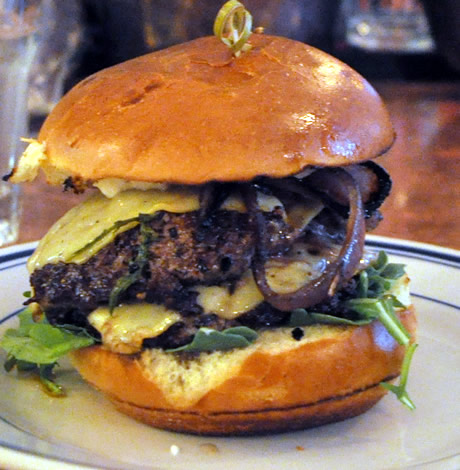
To see the winners of the Washington Blade’s Best of Gay D.C. readers poll in other categories, click here.
Best new restaurant
Barcelona
Runner-up: Rose’s Luxury
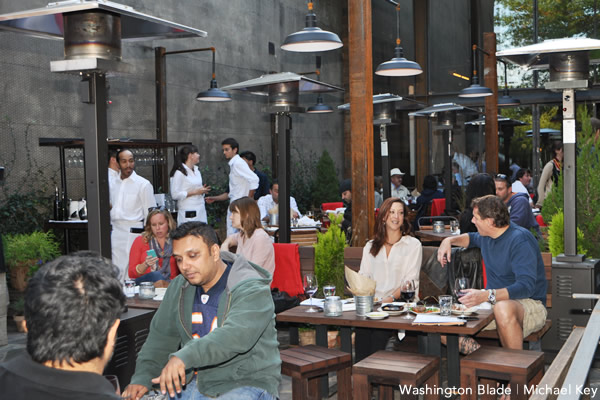
Barcelona (Washington Blade photo by Michael Key)
In the heart of the booming 14th Street N.W. corridor near Logan Circle is Barcelona, an always-bustling spot that has one of the largest outdoor seating areas in the neighborhood and a classy-yet-low-key vibe on the block between Q and R streets. Part of a chain, the restaurant, under the direction of Executive Chef John Critchley, features mostly tapas but has a few entrees as well. Many are Spanish-inspired (e.g. spiced beef empanadas or potato tortilla) but not all. It opened October 2013. (JD)
Barcelona Wine Bar & Restaurant
1622 14th St., N.W.
202-588-5500
Best Date Restaurant
Floriana
Runner-up: Le Diplomate
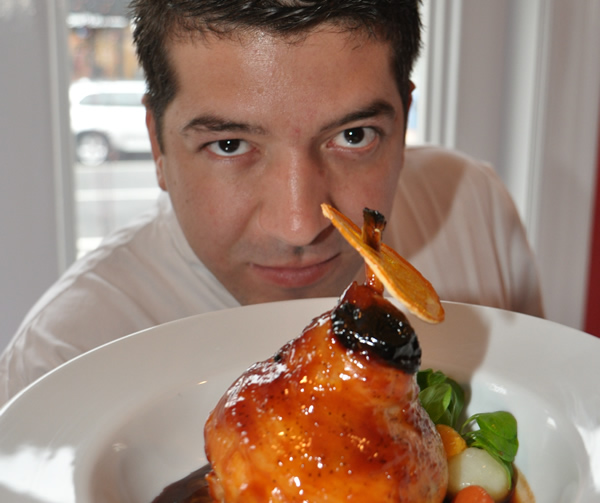
Floriana (Washington Blade file photo by Michael Key)
Best Wine Bar
Dito’s Bar at Floriana
Runner-up: Cork
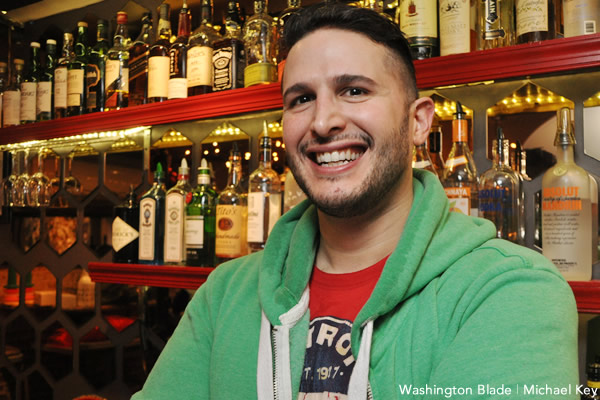
Dito’s Bar at Floriana (Washington Blade photo by Michael Key)
The perfect date night is planned for you at Floriana. Authentic Italian food, like butternut squash ravioli and lasagna, can transport any date from D.C. to Italy. Stop by Dito’s Bar for a drink to complete the romantic evening. All you have to do is show up. (MC)
Floriana
1602 17th St., N.W.
202-667-5937
Best Dessert
Curvy Mama Pies
Runner-up: Cake Love
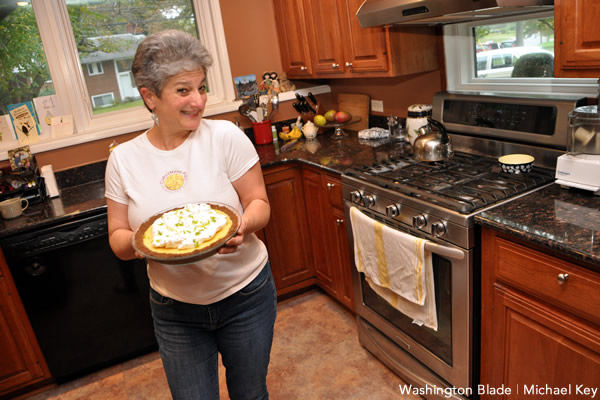
Curvy Mama Pies (Washington Blade photo by Michael Key)
Never grab a grocery store pie for the party again. Curvy Mama Pies’ online ordering service can have your pies ready in 48 hours. Try old favorites like “The Best Apple Pie Ever” and pumpkin pie or step outside the pie box and try “Aztec Chocolate Chess” or “Sweet Potato Bourbon.” (MC)
Curvy Mama Pies
Bethesda, Md.
301-717-3010
Best Boozy Brunch
Level One
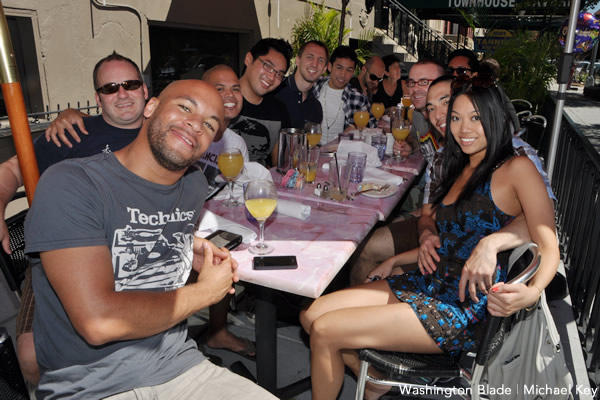
Level One (Washington Blade photo by Michael Key)
1639 R St., N.W.
202-745-0025
Runner-up: Freddie’s Beach Bar
Best Chef
Jamie Leeds (Hank’s Oyster Bar)
Runner-up: Jose Andres (Jaleo, Oyamel, etc.)
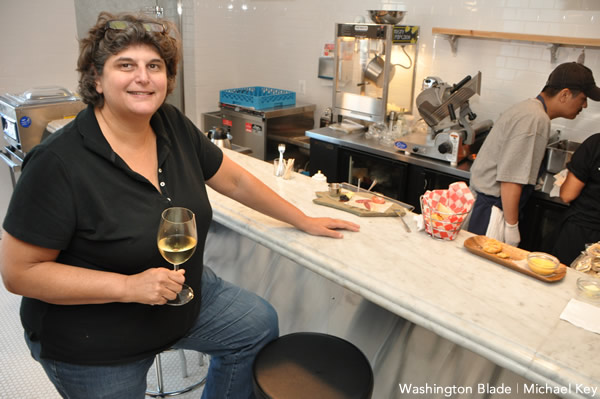
Jamie Leeds (Washington Blade file photo by Michael Key)
Long-time out restaurateur Jamie Leeds adds another accolade to her long list. In Washington since 2002, she opened the first Hank’s Oyster Bar in 2005 and now has locations in Capitol Hill and Old Town Alexandria in addition to its Q Street location just off 17th Street, N.W. If you’re into oysters, competitor Pearl Dive Oyster Palace on 14th, is undeniably great, but Hank’s always has a bounty of nirvana-inducing selections from a bewilderingly far-flung group of locales that are always mind bogglingly fresh. D.C. oyster heaven doesn’t get any better than this. (JD)
Hank’s Oyster Bar
1624 Q St., N.W.
Washington
202-462-HANK
1026 King St.
Alexandria, Va.
703-739-HANK
633 Pennsylvania Ave., S.E.
Washington
202-733-9171
Best Late Night Restaurant
Amsterdam Falafel
Runner-up: Annie’s Paramount Steak House

Amsterdam Falafel (Washington Blade photo by Michael Key)
Don’t let your standards slip just because it’s after hours. Fresh falafels are made to order here with 21 sauces and toppings to choose from. Customize the fries as well with dressings and sauces like Dutch mayo or homemade peanut sauce. (MC)
Amsterdam Falafel
1830 14th St., N.W.
202-232-6200
Best Coffee Shop
Soho Tea and Coffee
Runner-up: The Coffee Bar
Ditch the Starbucks and try a specialty coffee at Soho Tea and Coffee. Drinks with fun names like Hello Gorgeous Macchiato and Betty Boop, white or dark chocolate mixed with coffee, make this not your typical coffee shop. (MC)
2150 P St., N.W.
202-463-7646
Best Rehoboth Restaurant
Dos Locos
Runner-up: Purple Parrot
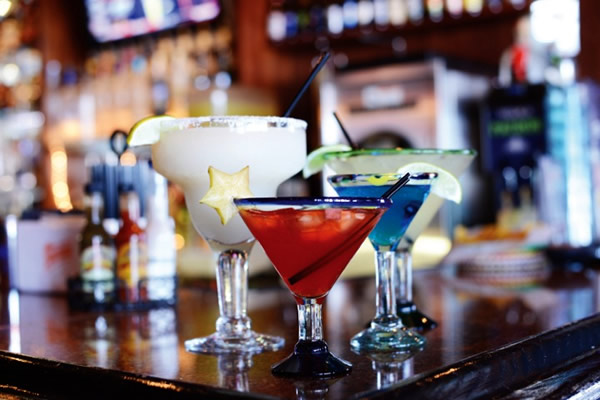
Drinks at Dos Locos (Photo courtesy Dos Locos)
Whether you’re looking to watch a game with friends at the bar while downing the renowned margaritas or in need of a family-friendly place for dinner, the gay-owned Dos Locos delivers. There are seasonal specials (don’t miss the pumpkin margarita), tequila tasting dinners, inventive entrees (we love the duck quesadilla) and unbeatable specials (like the $20 pitchers of sangria on Saturdays). (KN)
Dos Locos
208 Rehoboth Ave.
302-227-3353
Best Caterer
Chef Patrick
Runner-up: R&R Catering

Chef Patrick (Washington Blade photo by Michael Key)
Best Pizza
Matchbox
Locations vary
Runner-up: &Pizza
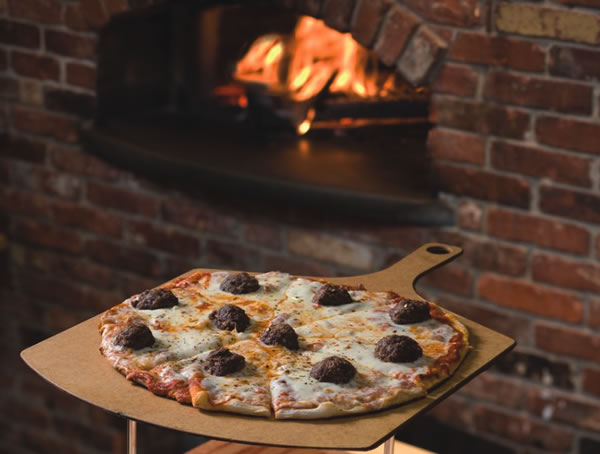
Spicy Meatball Pizza at Matchbox (Photo courtesy Matchbox Food Group)
Best Burger
Duke’s Grocery
Runner-up: Shake Shack
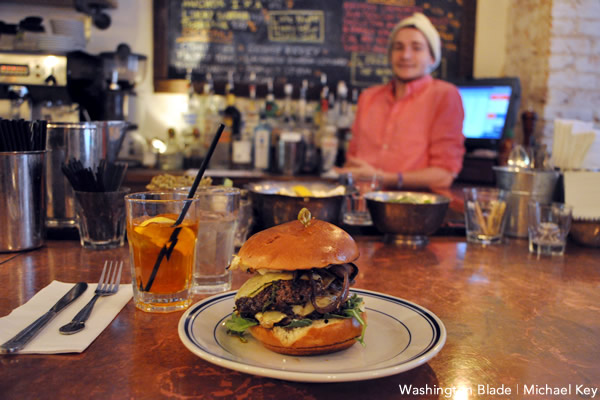
Duke’s Grocery (Washington Blade photo by Michael Key)
Inspired by East London corner cafes, Duke’s Grocery provides a casual environment. The menu changes daily based on which ingredients, sourced from local purveyors, are fresh and seasonal. The burgers, like all other dishes, are made from scratch. (SMH)
Duke’s Grocery
1513 17th St., N.W.
202-733-5623
Best Baltimore Restaurant
Woodberry Kitchen
Runner-up: City Café
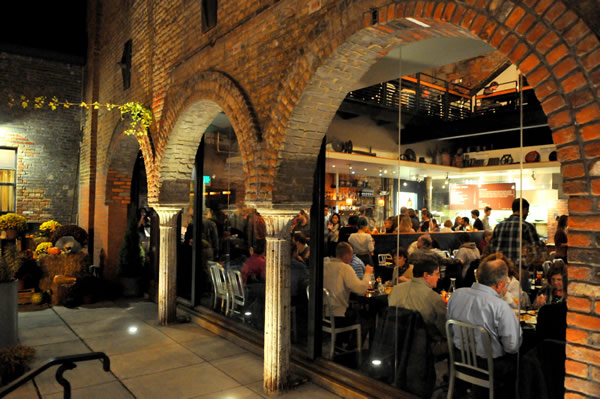
Woodberry Kitchen (Photo courtesy of Woodberry Kitchen)
Woodberry Kitchen is celebrating seven years in business and it’s still impossible to get a table without a reservation. Woodberry was an early proponent of the now-ubiquitous trend of farm-to-table cuisine. Chef Spike Gjerde is a James Beard semi-finalist as is the bar program. Woodberry supports sustainable agriculture, using ingredients from the Chesapeake region in its New American dishes. The success helped spawn a hot new spot, Parts & Labor, a butcher shop and restaurant, but there’s nothing like the original. Just make a reservation. (KN)
Woodberry Kitchen
2010 Clipper Park Road, #126
410-464-8000
Best Food Truck
D.C. Empanadas
Runner-up: Red Hook Lobster
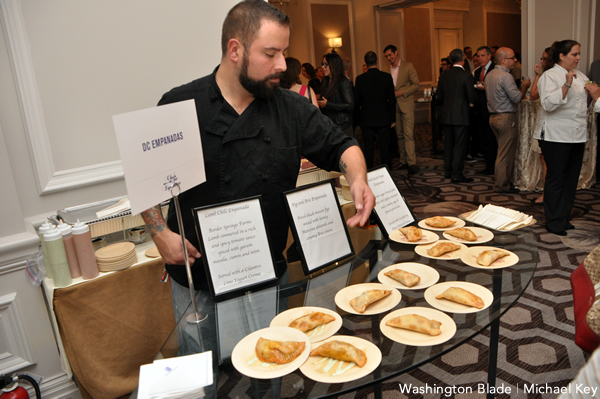
D.C. Empanadas at the Human Rights Campaign’s ‘Chefs for Equality’ event on Sept. 24, 2014. (Washington Blade photo by Michael Key)
D.C.’s only mobile gourmet empanada truck takes great care to provide hand-made delicacies using only local ingredients. A wide variety of beef, pork, chicken and vegetarian options rotate daily. Check Twitter @DCEmpanadas for the truck’s location. (SMH)
D.C. Empanadas
703-400-5363
Best Cheap Eat
District Taco
Runner-up: Stoney’s
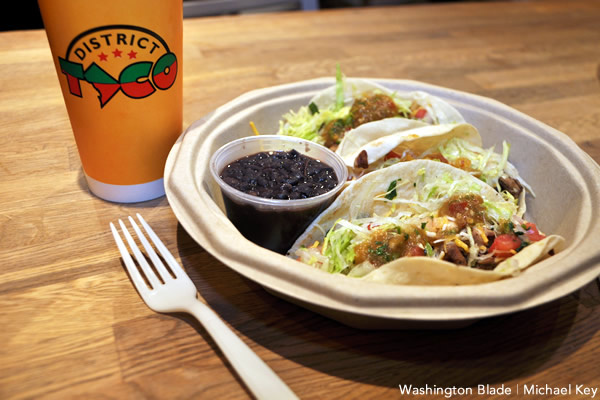
District Taco (Washington Blade photo by Michael Key)
What originated as a food truck in 2009 now serves the community in four locations in and around D.C. The Yucatan-style tacos are simple, healthful and made from quality ingredients and served in environmentally friendly packaging. (SMH)
District Taco
703-560-0369
Best Farmer’s Market
Eastern Market

Eastern Market (Photo by AgnosticPreachersKid; courtesy Wikimedia Commons)
225 7th St. S.E.
202-698-5253
Runner-up: Dupont Circle FRESHFARM Market
Best Steak
Ray’s The Steaks
Runner-up: Ruth’s Chris Steak House
Satisfy that steak craving at Ray’s The Steaks. A New York strip, filet mignon or one of their butcher cuts is guaranteed to hit the spot. Their beef is all aged in house and cuts butchered daily for the ultimate tasting experience. (MC)
Ray’s The Steaks
2300 Wilson Blvd., Arlington, Va.
703-841-7297
Best Donut
Winner: District Doughnut
Runner-up: Krispy Kreme
Caramel apple streusel, maple butter pecan, apple cider and the list goes on for the donut flavors you can try here. The flavor schedule changes daily so be sure to come back again and again to indulge in something new. (MC)
District Doughnut
749 8th St., S.E.
202-350-0799
a&e features
35 years after ‘Truth or Dare,’ Slam is still dancing
Salim Gauwloos on Madonna, HIV, and why he almost didn’t audition for Blond Ambition Tour

Most gay men of a certain age remember “the kiss.”
It was the moment Madonna’s dancers Salim Gauwloos and Gabriel Trupin locked lips in the hit 1991 documentary film “Truth or Dare,” which is celebrating its 35th anniversary this spring.
The kiss was hot, but what made it groundbreaking is that it appeared in a mainstream Hollywood movie that screened in suburban multiplexes across the country. This wasn’t an obscure art house film. The movie, and tour on which it was based, received months of breathless media attention all over the world for bold expressions of female empowerment and queer visibility. Madonna was threatened with arrest in Toronto for simulating masturbation on stage and Pope John Paul II urged Catholics to boycott the show, triggering a media firestorm.
“Truth or Dare” was billed as a behind-the-scenes documentary of the tour, but it quickly became clear that the real star of the show wasn’t Madonna, but rather her colorful troupe of seven backup dancers, six of whom identified as gay: Kevin Stea, Carlton Wilborn, Luis Xtravaganza Camacho, Jose Gutierez Xtravaganza, Gauwloos, and Trupin; Oliver Crumes III identifies as straight.
We saw them party and march in the New York City Pride parade. They were unabashedly queer at a dangerous time — before protease inhibitors began to stem the AIDS plague and before most celebrities and politicians embraced the gay community in any real way. Being out in 1991 carried major risks to career and reputation.
Enter Gauwloos, one of those brave dancers who vogued his way into the hearts of countless gay men entranced by his handsome looks, his stage presence, and dance skills.
Gauwloos — known then and now as “Slam”— sat down with the Blade to talk Madonna, the lasting impact of “Truth or Dare,” the public disclosure of his HIV status, and plans for a new book on his life.
His story is fascinating — from growing up in Europe to dancing in New York to landing the gig of a lifetime with Madonna. He performed on that tour while secretly HIV positive and went without medical treatment for 10 years because he was living in the United States as an undocumented immigrant. Not even Madonna knew of his HIV status. Two other dancers on the tour were also HIV positive but no one talked about it. Ironically, Madonna was singing “Express Yourself” and advocating for condom use during her concerts yet backstage three of her dancers were secretly positive.
“A lot of people were dying so I wasn’t going to tell Madonna I had HIV,” said Slam, now 57. “And the others didn’t either. It wasn’t the moment to do it. She used to make speeches about Keith Haring and AIDS and I thought it’s going to be me next.”
Gabriel Trupin died of AIDS in 1995. Slam was diagnosed at age 18 in 1987, a frightening time when a positive test result often meant a death sentence. He booked the “Blond Ambition Tour” at age 21 after moving to New York. His friends encouraged him to audition but Slam resisted because he wasn’t a big Madonna fan.
“It was crazy, everyone wanted that job,” he said, “but I wanted to dance with Janet Jackson and Paula Abdul.” He listened to his friends and shortly after the audition, Slam received a call from Madonna herself inviting him to join the tour.
“We all wanted to be stars but not even Madonna knew how big that tour would become. The way it was choreographed and directed, the stars aligned. … It never looks dated even today.”

The world tour kicked off in Japan in April 1990 then moved to the United States and Europe, stirring controversy wherever it went. There was the iconic cone bra; the aforementioned simulated masturbation during “Like a Virgin”; and religious imagery that offended many Catholic groups and the Vatican.
And the controversy didn’t end with the tour. Cameras were rolling throughout the tour for what Slam thought would be a “video memory” for Madonna. But as the tour unfolded, director Alek Keshishian reportedly became more interested in what was happening behind the scenes so plans for mere tour footage were expanded into a full documentary.
“We were young and partying and didn’t really know what was going on,” Slam said. “You live in this celebrity bubble and you sign a paper – I don’t even know what I signed.”
In 1992, Kevin, Oliver, and Gabriel sued Madonna for invasion of privacy and fraud claiming she used some footage without their consent. They claim they were told nothing would be included in the film that they didn’t want to be seen. In one specific incident, Gabriel alleged that he told producers he didn’t want the scene of him kissing Slam to be in the film as he wasn’t fully out.
“Gabriel was forcibly outed,” in the movie, Kevin said in a 2016 interview.
Slam did not join his colleagues in the lawsuit.
“I couldn’t sue because I was illegal but I wasn’t ever going to sue,” Slam said. “I’m not a suing kind of person. But good for them, they fought for it and won. A lot of people don’t have the balls to sue Madonna.” The suit was settled two years later for an undisclosed sum.
“We were all conflicted about the kiss,” he said with a laugh. “The kiss, oh my God, my boyfriend is going to kill me! Belgian stress!”
Beyond worrying about his boyfriend’s reaction, Slam had concerns about the impact of being openly gay on his modeling career.
“In 1990, you couldn’t get high fashion campaigns as an openly gay model,” he said. “I was worried about that. I couldn’t get a campaign because I was gay. My agency told me to say I was straight and it was just a game.”
In 2016, pegged to the 25th anniversary of “Truth or Dare,” the surviving six dancers filmed a documentary about their lives post-Madonna titled “Strike A Pose.” In it, Slam publicly revealed his HIV status for the first time in an emotional scene with his former colleagues.
“I found the strength to tell the world I have HIV,” he recalls. “I was scared but I felt brave. The outcome and messages were beautiful. After I saw ‘Strike A Pose,’ I knew we gave people hope. And not just for gay people.”
He was infected in 1987 but didn’t get treated until 1997. After the tour ended, he said he went into a depression and his agency dropped him.
“I was partying too much after the tour,” he recalls. “I made a decision to live as an illegal alien.” In 1997, Slam collapsed and was rushed to the hospital with pneumonia.
“They started treating me and thank God the new HIV drugs were out, the cocktails, it took me a couple months to get better.”
Madonna didn’t participate in “Strike A Pose” and Slam said he hasn’t seen or spoken to her since the end of the tour. He said he had no idea of the impact “Truth or Dare” would have.
“You look at this movie in 1991 and you don’t think it’s going to be such a big thing and 35 years later it’s still helping people,” he said. “It was helpful for people who felt alone at that time. It was such an important documentary.
“I don’t think younger gay people realize how important Madonna was to gay and queer visibility — she was a big part of it. We showed the world it’s OK to be gay and that was the great message of this movie.”
He noted that, decades later, many of his friends have transgender kids and that queer culture is represented in much of mainstream pop culture.
“It’s amazing how far we’ve come,” he said. “I know we’ll always be marginalized but we have come so far. I’m really proud of our community. The current nightmare will be over and I do believe that things will get better.”
Referencing President Trump’s attacks on the LGBTQ community and crackdown on immigration, Slam described the situation in the U.S. today as “sad.”
“Everything is such a mess,” he said. “Some of these people have lived here 30-40 years and they take you out of your home. I can’t even imagine. It breaks my heart. When I was illegal it was a different story.”
Slam met his husband, Facundo Gabba, who’s from Argentina, in 2000, and he helped him get a legal case together to win citizenship. He filed a case in 2001 and was told there was a 99 percent chance he wouldn’t be permitted to stay in the United States because they weren’t allowing HIV-positive immigrants to remain in the country. But he got his green card anyway in 2005 and became a U.S. citizen in 2012.
Today, Slam and Gabba live in Brooklyn, though they travel a lot because “I can’t take the cold.” The couple married in Argentina in 2010 and in the U.S. in 2016.
Slam is still dancing and working as a choreographer. He’s teaching at a contemporary dance festival in Vienna in July and even offers online lessons via Salimdans.com.
As a longtime HIV survivor, Slam is dedicated to a healthful lifestyle.
“You have to keep moving; when you move you stay healthy,” he says. “Dance heals everything. I do yoga, I eat healthy and clean as possible. I don’t watch much TV … I try to stay healthy and positive. If I absorb all of the negativity I would be sick.”

In addition to his ongoing work in dance and choreography, Slam is in the early stages of writing a book about his extraordinary life and pioneering career.
“I always knew I had a book inside of me. I want to talk about my HIV status. I know I can inspire more people. I want to tell even more secrets in the book; secrets are a poison so I want to tell everything.”
Among those secrets, he notes, is a desire to write about his strict Muslim father and the years he spent as an undocumented immigrant in America.
“Those are the things I want to talk about, the struggles. It’s a love story, hope and resilience. I know it will help people.”
As for his friends from the tour, Slam says he remains in contact with Gabriel’s mother and José Xtravaganza is his best friend. Baltimore’s Center Stage theater is currently developing a new musical about Xtravaganza’s life. And Slam said he occasionally talks to Oliver, though “he still can’t pronounce Sandra Bernhard’s name.”
At the end of our interview, Slam indulged a round a rapid fire questions:
• Favorite song to perform in the “Blond Ambition” tour? “Express Yourself.”
• Aside from Madonna, who was your favorite artist you worked with? Toni Braxton in “Aida” on Broadway.
• Favorite Madonna song? “Live to Tell”
• Favorite Madonna video? “Bedtime Stories”
• What’s more stressful: performing in a concert or performing on the VMAs? “Both, because we always had to be perfect.”
• Did you go to Madonna’s recent “Celebration” tour? “I didn’t see the show but I saw clips online.”
• What do you remember most about performing “Vogue” at the VMAs? “It was nerve-racking for them to flip those fans.”
• When was the last time you vogued? “I teach classes so a couple weeks ago.”
Books
Love or fear flying you’ll devour ‘Why Fly’
New book chronicles a lifetime obsession with aircraft

‘Why Fly’
By Caroline Paul
c. 2026, Bloomsbury
$27.99/256 pages
Tray table folded up.
Check. Your seat is in the upright position, the airflow above your head is just the way you like it, and you’re ready to go. The flight crew is making final preparations. The lights are off and the plane is backing up. All you need now is “Why Fly” by Caroline Paul, and buckle up.

When she was very young, Paul was “obsessed” with tales of adventure, devouring accounts written by men of their derring-do. The only female adventure-seeker she knew about then was Amelia Earhart; later, she learned of other adventuresome women, including aviatrix Bessie Coleman, and Paul was transfixed.
Time passed; Paul grew up to create a life of adventure all her own.
Then, the year her marriage started to fracture, she switched her obsession from general exploits to flight.
Specifically, Paul loves experimental aircraft, some of which, like her “trike,” can be made from a kit at home. Others, like Woodstock, her beloved yellow gyrocopter, are major purchases that operate under different FAA rules. All flying has rules, she says, even if it seems like it should be as freewheeling as the birds it mimics.
She loves the pre-flight checklist, which is pure anticipation as well as a series of safety measures; if only a relationship had the same ritual. Paul loves her hangar, as a place of comfort and for flight in all senses of the word. She enjoys thinking about historic tales of flying, going back before the Wright Brothers, and including a man who went aloft on a lawn chair via helium-filled weather balloons.
The mere idea that she can fly any time is like a gift to Paul.
She knows a lot of people are terrified of flying, but it’s near totally safe: generally, there’s a one in almost 14 million chance of perishing in a commercial airline disaster – although, to Paul’s embarrassment and her dismay, it’s possible that both the smallest planes and the grandest loves might crash.
If you’re a fan of flying, you know what to do here. If you fear it, pry your fingernails off the armrests, take a deep breath, and head to the shelves. “Why Fly” might help you change your mind.
It’s not just that author Caroline Paul enjoys being airborne, and she tells you. It’s not that she’s honest in her explanations of being in love and being aloft. It’s the meditative aura you’ll get as you’re reading this book that makes it so appealing, despite the sometimes technical information that may flummox you between the Zen-ness. It’s not overwhelming; it mixes well with the history Paul includes, biographies, the science, heartbreak, and exciting tales of adventure and risk, but it’s there. Readers and romantics who love the outdoors, can’t resist a good mountain, and crave activity won’t mind it, though, not at all.
If you own a plane – or want to – you’ll want this book, too. It’s a great waiting-at-the-airport tale, or a tuck-in-your-suitcase-for-later read. Find “Why Fly” and you’ll see that it’s an upright kind of book.
The Blade may receive commissions from qualifying purchases made via this post.
Theater
Out actor Kevin Cahoon on starring role in ‘Chez Joey’
Arena production adapted from Broadway classic ‘Pal Joey’

‘Chez Joey’
Through March 15
Arena Stage
1101 Sixth St., S.W.
Tickets start at $93
Arenastage.org
As Melvin Snyder in the new musical “Chez Joey,” out actor Kevin Cahoon plays a showbiz society columnist who goes by the name Mrs. Knickerbocker. He functions as a sort of liaison between café society and Chicago’s Black jazz scene circa 1940s. It’s a fun part replete with varied insights, music, and dance.
“Chez Joey” is adapted from the Broadway classic “Pal Joey” by Richard Rodgers and Lorenz Hart. It’s inspired by John O’Hara’s stories based on the exploits of a small-time nightclub singer published in The New Yorker.
A warm and humorous man, Cahoon loves his work. At just six, he began his career as a rodeo clown in Houston. He won the Star Search teen division at 13 singing songs like “Some People” from “Gypsy.” He studied theater at New York University and soon after graduating set to work playing sidekicks and comedic roles.
Over the years, Cahoon has played numerous queer parts in stage productions including “Hedwig and the Angry Inch,” “La Cage aux Folles,” “Rocky Horror” as well as Peanut in “Shucked,” and George the keyboardist in “The Wedding Singer,” “a sort of unicorn of its time,” says Cahoon.
Co-directed by Tony Goldwyn and the great Savion Glover, “Chez Joey” is a terrific and fun show filled with loads of talent. Its relevant new book is by Richard Lagravenese.
On a recent Monday off from work, Cahoon shared some thoughts on past and current happenings.
WASHINGTON BLADE: Is there a through line from Kevin, the six-year-old rodeo clown, to who we see now at Arena Stage?
KEVIN CAHOON: Anytime I want to land a joke in a theater piece it goes back to that rodeo clown. It doesn’t matter if it’s Arena’s intimate Kreeger Theatre or the big rodeo at the huge Houston Astrodome.
I was in the middle stadium and there was an announcer — a scene partner really. And we were doing a back and forth in hopes of getting laughs. At that young age I was trying to understand what it takes to get laughs. It’s all about timing. Every line.
BLADE: Originally, your part in “Chez Joey” Melvin was Melba who sings “Zip,” a clever woman reporter’s song. It was sort of a star feature, where they could just pop in a star in the run of “Pal Joey.”
CAHOON: That’s right. And in former versions it was played by Martha Plimpton and before her Elaine Stritch. For “Chez Joey,” we switched gender and storyline.
We attempted to do “Zip” up until two days before we had an audience at Arena. Unexpectedly they cut “Zip” and replaced it with a fun number called “I Like to Recognize the Tune,” a song more connected to the story.
BLADE: Wow. You must be a quick study.
CAHOON: Well, we’re working with a great band.
BLADE: You’ve played a lot of queer parts. Any thoughts on queer representation?
CAHOON: Oh yes, definitely. And I’ve been very lucky that I’ve had the chance to portray these characters and introduce them to the rest of the world. I feel honored.
After originating Edna, the hyena on Broadway in “The Lion King,” I left that to do “Hedwig and the Angry Inch” as standby for John Cameron Mitchell, doing one show a week for him.
Everyone thought I was crazy to leave the biggest musical of our time with a personal contract and getting paid more money that I’d ever made to get $400 a week at the downtown Jane Street Theatre in a dicey neighborhood.
At the time, I really felt like I was with cool kids. I guess I was. And I never regretted it.
BLADE: When you play new parts, do you create new backstories for the role?
CAHOON: Every single time! For Melvin, I suggested a line about chorus boys on Lakeshore Drive.
BLADE: What’s up next for Kevin Cahoon?
CAHOON: I’m about to do the New York Theatre Workshop Gala; I’ve been doing it for nine years in a row. It’s a huge job. I’ll also be producing the “Cats: The Jellicle Ball” opening on Broadway this spring; it’s a queer-centric uptown vogue ball with gay actor André de Shields reprising his role as “Old Deuteronomy.”
BLADE: There’s a huge amount of talent onstage in “Chez Joey.”
CAHOON: There is. I’m sharing a dressing room with Myles Frost who plays Joey. He won accolades for playing Michael Jackson on Broadway. We’ve become great friends. He’s a miracle to watch on stage. And Awa [Sal Secka], a D.C. local, is great. Every night the audience falls head over heels for her. When this show goes to New York, Awa will, no doubt, be a giant star.
BLADE: Do you think “Chez Joey” might be Broadway bound?
CAHOON: I have a good feeling it is. I’ve done shows out of town that have high hopes and pedigree, but don’t necessarily make it. “Chez Joey” is a small production, it’s funny, and audiences seem to love it.


















